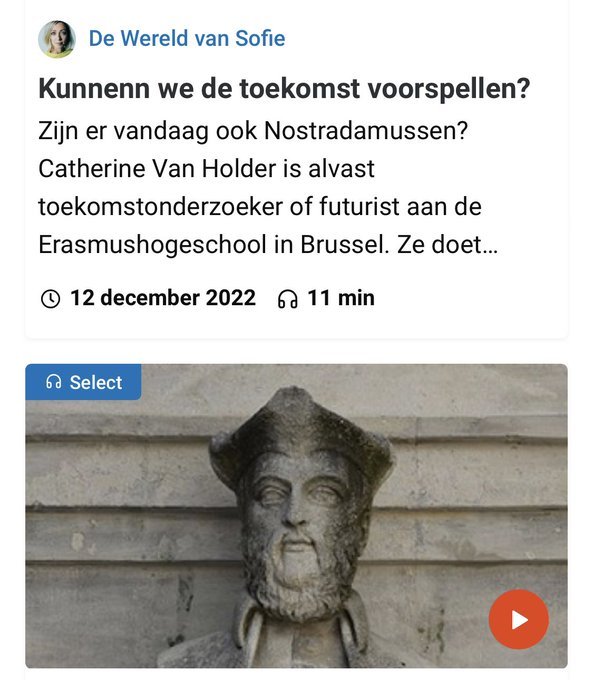From this academic year onwards, students from as many as 10 different educational programs have access to an elective course called “Futures Studies”. Given the contextual specifics (students from 5 campuses with each having specific schedules, interests and goals) and my conviction a future-oriented course can’t be but a reflection of how education in the future might look like, implies this course has turned out very different from a standard “I teach, you listen” approach.
The course is designed entirely around the principles of project-based learning, in which students are conducting a project called “futures of X”. Given the diversity of their backgrounds, X can be a number of topics, as diverse as healthcare, education or governance.
To support them in conducting their project, each chapter of the course syllabus is centered around an assignment. Together with a peer group, students are supposed to tackle those assignments, which all combined form a portfolio, which they can then use as input for their individual exam assignments. Rather than “lecturing” knowledge, my main role is that of a coach and architect.
Group sessions are organized along the lines of the flipped-classroom, whereby those sessions are entirely dedicated to the application of knowledge. The knowledge needed to execute the assignments has been processed individually before the group sessions, through means of knowledge clips and an e-syllabus. At all times students can (and are stimulated) to ask for feedback on the work they are doing - as to get the most out of this learning by doing process.
Furthermore, students are made aware of the value of feedback to both each other and me as quintessential elements of any learning and experimenting journey. Therefore all feedback on the set-up of the course is more than welcomed.
Democracy - Challenges and Futures /
And its official, VUB’s new offering from this academic year onwards: “Democracy: Challenges and Futures”, taught by Prof. Didier Caluwaerts and myself, and the result of a very fertile co-production process between UAB, the Political Sciences department of VUB and Knowledge Centre Open Time.
Empowering Futures Conference 2023 /
People close to me are well aware of my keen interest in all things governance futures. So I’m more than looking forward to present at the next futures conference organized by Finland Futures Research Centre (FFRC) and Finland Futures Academy (FFA): EMPOWERING FUTURES - Long-term Governance, Democracy and Futures Research.
There is an urgent need for long-term futures thinking in order to sustain possibilities for alternative and creative solutions to complex crises and empower futures. For the next Futures Conference, we will gather in Turku to discuss about the futures of democracy, trust, power and sustainability, which are tightly connected to these crises.
A perfect moment to test some of the new material I have been working on (in the context of my forthcoming PhD dissertation) to a critical audience.
Microcredit Futures Studies & Political Sciences /
In these turbulent, transitionary times, lifelong learning is known to be one of the transition priorities of the Flemish Future Vision 2050. Together with UAB, EhB and VUB, I’ve been part of a wonderful team cooking up a new microcredential combining ‘futures studies’ with ‘political sciences’.
While still ironing out the last administrative and content-related elements, the microcredential ‘democracy: challenges and futures’ will be part of VUB and EhB’s educational offerings for lifelong learning from next academic year onwards.
Meanwhile both research units are investigating how to work more closely together in the near future. Stay tuned.
Futures Studies Elective /
With the year coming to a closure, it’s time to look back. In line with Unesco’s consideration of ‘futures literacy’ as a quintessential 21st century competency, I’m proud to announce a futures studies elective in the making, which will be taught to a range of EhB and VUB students from next academic year onwards.
Funded by the Flemish Educational government program ‘voorsprongfonds’, the past year has been one of preparatory work, both in aligning the elective course to a diverse range of educational programs at both educational institutions as in laying the foundations of the course contents.
Honored to be responsible for such an innovative, impactful and relevant endeavor.
Predicting Futures? /
Nice chat with @sofie_lemaire about how and why futurists don’t predict but instead explore multiple futures on @radio1be last week. Always great to when ‘futures studies’ get the mainstream traction it deserves!
SCTPLS Conference /
So, I wrote this paper on the use of Complexity Science in Futures Studies. And decided to throw the ideas to the lions at the annual conference of the Society for Chaos Theory in Psychology & Life Sciences.
Research, design & innovation for the 6G world /
Crazy enough to take on the challenge to introduce uncertainty, speculative design and wicked problems to an audience of engineers at the 6G symposium Europe.🤘🏻
Once and Future Sins /
BrabantKennis invited me to take them and the audience on a quick tour into the deadly sins of the future.
De Zaak Cultuur /
‘Als een Fenix, uit de as verrezen’ is a speculative design interview in a newspaper dating back from 2043… The piece, developed by me and commissioned by Kunstenpunt, touches upon a range of futures ideas on the arts, it’s purpose and (financial) sustainability.
https://www.kunsten.be/de-zaak-cultuur/
Embodied Belonging in Urban Settings /
1 Design Sprint, 3 challenges, 6 teams. For 5 consequtive days Stefaan Vandist and I challenged Groningen to become a Generous City inspired by concepts such as embodied belonging, Tim Gill’s importance of play and the importance of a city as a third place…
The ecology of disease /
Lost Ways of Knowing /
Inspiring alternate ways of knowing.
“Understanding the different ways in which the left and right hemispheres of our brains perceive reality gives us an essential insight into not just into ourselves, but into our history and the development of the culture we’re immersed in. McGilchrist argues that civilisation thrives when these two hemispheres are in balance. When the left hemisphere’s perspective begins to dominate, and we rely too much on rational, reductive knowing, civilisation starts to fray.”
All things futures /
Collapse and the emergence of new, evolutionary structures /
Future Library /
How may libraries remain relevant in these rapidly changing & challenging times? Brussels-based Muntpunt invited me to informatie aan zee to share key insights emerging from the visioning quest upon which we embarked together with Muntpunt over the past months.
Futures of the Arts /
On the use of futures for and within the arts and the artistic field..
Podcast by Kunstenpunt & Maja Kuzmanovic
Spoiler Alert: Pantopicon and myself are looking forward working with Kunstenpunt on futures the coming months!
Harbour Future(s) /
What if genetically engineered plants & organisms would screen the flow of people & goods in our ports? What if climate change & shifting global geopolitical/economic power alter the routes and nature of shipping? What if new measures for progress beyond GDP shake up value & supply chains? Back in 2017 the Zeeland Seaports (Vlissingen and Terneuzen) and the Ghent Port Company merged into the cross-border North Sea Port, becoming a new European top 10-player. In the context of their latest joint strategy development process, I was asked to challenge & inspire participants’ views of the future with a keynote focussing on key external developments potentially impacting the future of the North Sea Port’s ecosystem.
Family Politics /
Since contextualization helps understanding, this is one worth sharing.
"Op vraag van het Instituut voor de Gelijkheid van Vrouwen en Mannen (IGVM) onderzocht het hoe van in de negentiende eeuw tot nu omgegaan werd met ouderschap. Het resultaat is opmerkelijk. De studie toont het bestaan van een politieke wil, van in de negentiende eeuw tot rond de jaren 1960, om een nieuw gezinsmodel te creëren én op te leggen.
Het klassieke rollenpatroon werd dus opgelegd, en ook nog eens vrij hardnekkig en agressief gepromoot, waardoor de norm geïnternaliseerd werd. Vaders noch moeders waren zich er na verloop van tijd nog van bewust dat het om van buitenaf opgelegde voorschriften ging die ze niet zelf hadden gekozen, en dat het ooit anders was.
Het opgelegde rolmodel, dat meer dan een eeuw zwaar gepromoot werd en in de geesten kroop, blijft tot vandaag doorwerken. Het zit impliciet in veel maatregelen en wetgeving. "
Genomics /
One of the recent projects I am delighted to be involved in.



























